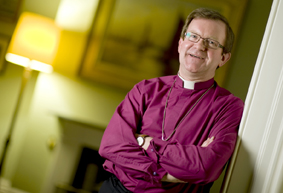Bishop gives unique diocese new challenges
This is a unique diocese where Christians are innovative about sharing their faith.

Bishop Christopher reflects on 18 months in the job
The Diocese of Portsmouth has a strong sense of identity, and worshippers are committed to each other and to God. Now it’s time to be more confident in our evangelism and pro-active about challenging society’s values.
That’s the vision from the Bishop Christopher as he reflects on almost 18 months in the job – and looks forward to the future.
He gave his verdict to the our Diocesan Synod, which brings together 60 clergy and 60 lay worshippers from the diocese’s 142 parishes in south-east Hampshire and the Isle of Wight to decide policy and discuss issues twice or three times a year.
Bishop Christopher was installed as bishop in September 2010, and decided to use part of this Diocesan Synod meeting to talk about where he thinks God is leading the diocese as a whole.
He praised the diocese’s Ministry for Mission initiative, which started before his installation. It aims to help worshippers understand how God is calling them to serve their communities and share their faith more effectively.
“This is a unique diocese,” he said. “Portsmouth’s distinction lies not in its size or its staffing but in the qualities of its people, both its churchgoers and the wider population.
“In this diocese we are flexible and nimble, hard-working and robust, responsive and creative. I see this, value it, and thank God for it. More than once people have said that this diocese can punch beyond its weight. Though I am not wholly at ease with the boxing metaphor I know what they mean, but our calling is not to outdo or beat anyone else. We are to play our part in the work of all the people of God, the whole church, in proclaiming the kingdom and living its emerging reality.
“Jesus calls us to do this, and we must continue to discern how we are to be both his disciples and his apostles. We are not only called, we are also sent. To be confident in faith, clear about our vocation, inevitably compels us to be ready and willing to go out in witness, love and service.
“Ministry for Mission, our framework for growth, properly puts our calling first. Then it leads us beyond the place from where we are, into being trained, structured and supported. We must continue to look out, to lift our sights, and to engage more fully as a diocese, ecumenically, and in our communities.
“Firstly, there is a stronger sense of identity than you sometimes suggest. Diversity abounds. Portsmouth is not Petersfield, Swanmore (Isle of Wight) is different from Swanmore (mainland), Botley, Bembridge and Blendworth are each special. But your common identity is far stronger than the other four dioceses in which I have served.
“Secondly, there are very many excellent initiatives in this diocese which ‘speak’ of gospel service and witness to our communities, society and world, but we are sometimes too shy about explaining the reasons for our actions and commitments. Let us be clearer about the hope that is ours. For much of my lifetime mission was a somewhat embarrassing term for Christians, but no longer. Now we need to speak of evangelism with the same confidence as we continue to work for environmental responsibility, for the homeless, for the vulnerable, young, and elderly. We do all this and much more because we are as Christians, so let us say so.
“Thirdly, our society is often marked by a competitive consumerism which sometimes becomes aggressive or selfish. The Christian community seeks to model a different pattern and to offer glimpses of the kingdom of God. So we need to remain alert and challenge in our communities and diocese what is dishonourable or disrespectful.
“Fourthly, the level of commitment here to giving our money to God is notably good. This reflects our commitment to each other, tight financial management by the diocese and parishes, and a recognition that we have mutual obligations and privileges. So we need to build on this, first by improving the modest individual level of giving in the diocese, and second by looking to become self-sufficient in budgeted income and expenditure. So I ask first, how many of us genuinely give to the point where it makes a difference and, second, what things could we do if money coming from outside the diocese was available for special or new ministries? We are limited only by the generosity of our commitment.
“And fifthly, there are admirable numbers of Christians offering ministry at work and at home as well as in church, in towns and villages, informally as missioners, evangelists, and pastors, sometimes with titles like youth worker, flower-arranger or churchwarden and lots of others. With them we rely on the clergy, self-supporting and stipendiary, and self-supporting lay Readers for leadership. People continue to offer themselves for these ministries licensed by me, and we are blessed, but we need more who are younger and who are willing to be sent. An offer to minister and serve only in one place, or with restriction, is welcome but what we need looking forward are leaders ready to be nimble and creative, eager to go where they are needed.
“Together as bishop, people and clergy we are called and sent out for the kingdom. So we are to be bold – aspirational, as the world says - and confident that Jesus calls and sends us. Called, trained, structured, and supported for growth; we are ready together, in the name of Jesus, graciously, generously, to be sent.”